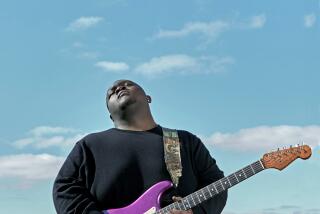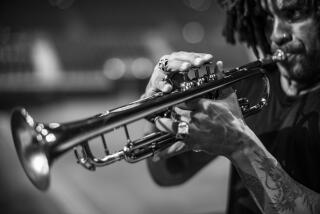‘Marksman’ Mark Whitfield Keeps His Eye on the Target : Jazz: The guitarist, who was weaned on Ellington and Basie, finds that re-creating past sounds makes him a good living in the present.
“When I left school and went to New York,” said the 24-year-old guitarist Mark Whitfield, “I had accepted in my heart that I was going to play jazz, and live in a small apartment in Brooklyn and just be poor for the rest of my life. Anything else that happened would just be a lucky break.”
As luck would have it, something else did happen. Three years ago, when the Berklee College of Music alumnus was jamming at a New York Club, George Benson heard him. Before long he was on tour with organist Jack McDuff (Benson’s first band leader) and, through Benson’s intercession, had a contract with Warner Bros. Records. His first album, “The Marksman,” in which he is backed by Wynton Marsalis’ rhythm section, is selling briskly.
Last week, after a grueling but gratifying 3 1/2-week tour of Japan dueting with Carmen McRae, he came home to his not-too-small apartment in Baton Rouge, La., where he lives with his wife and 8-month-old son. Over the weekend, he arrived in Los Angeles to play his first two Southland dates, Tuesday at Elario’s in La Jolla and tonight at Nucleus Nuance in West Hollywood.
Whitfield is a maverick who shuns fusion, opts for straight-ahead jazz, and whenever possible avoids amplifiers. “I’m having a guitar made,” he says, with a microphone mounted on the inside and using a wireless set-up, so I won’t need an amp at all. That natural sound blends better with the other acoustic instruments.”
Raised in Lindenhurst, Long Island, Whitfield came to jazz by natural causes: Two parents who loved the music, raised him on Ellington and Basie records, and once took him to hear the Count Basie Band, where upon he fell in love with Freddie Green’s acoustic rhythm guitar.
“My high school band director was also a jazz fan and had played in big bands. A teacher in Seattle, where I lived for a year after my parents moved there, had played with Earl Hines. He gave me my first Charlie Christian record. I was 15.”
Playing in the school band, he won two Berklee prizes and was offered a full scholarship, moving to Boston to study there in 1983.
The experience was a mixed blessing. “The school’s emphasis has changed to fusion. Out of the 1,000 or more guitarists who passed through Berklee during my four years there, I doubt that more than 10 or 15 put a serious effort into playing straight-ahead.”
Much of his jazz wisdom came from the records of George Benson and such long-gone masters as Charlie Christian and Wes Montgomery. His mind and fingers remain planted firmly in the mainstream. He scorns the theory that equates fusion with progress, or his own creative style with nostalgia.
“This is a spontaneous music in which nothing is ever played the same way twice; except the style may seem nostalgic to people who grew up with it, but for me it’s new. What the fusion players are doing--John Scofield, Mike Stern, guys like that--I wouldn’t call an improvement in any way on what Wes Montgomery did back in the 1960s. They are good musicians, but they don’t represent any advance.”
Whitfield realizes that the music he has embraced encompasses a broad range of tastes. He has begun to develop as a composer; six of the nine cuts in the album are his own, and at least two, “Medgar Evers Blues” and “The Marksman” (the title cut) shows substantial promise.
In the wake of his discovery by Benson have come other delights, among them a record date for RCA with Cleo Laine that found him in the company of trumpeter Clark Terry and saxophonist Jane Ira Bloom. Betty Carter has sat in with his group. Carmen McRae, who first heard him last summer at the North Sea Jazz Festival in Haarlem, plans to bring him back to Los Angeles in February to play with her at Catalina’s.
Half a century has passed since Charlie Christian, in his historic sessions with Benny Goodman, set the course for modern jazz guitar. Mark Whitfield is one of a welcome minority whose roots go clear back to those catalytic recordings.
Mark Whitfield: Tonight at Nucleus Nuance in West Hollywood: (213) 939-8666.
More to Read
The biggest entertainment stories
Get our big stories about Hollywood, film, television, music, arts, culture and more right in your inbox as soon as they publish.
You may occasionally receive promotional content from the Los Angeles Times.










